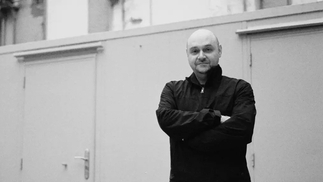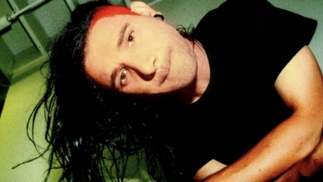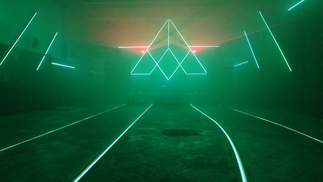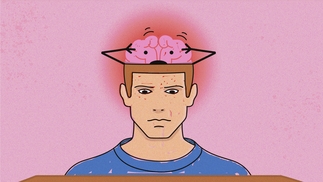ED RUSH & OPTICAL STILL BIG IN THE GAME
Ed Rush & Optical are still big in the game. They may have gone through fatherhood and other projects individually, but when they come together they are a force to be reckoned with like no other in drum & bass...

Spend any amount of time with Ed Rush, be it five minutes or five hours, and he won’t stop talking — and not for one second is he boring. As good a listener as he is chatty, the long-standing British drum & bass DJ/producer — born Ben Settle — is very satisfying to tell a story to, his reactions animated and encouraging. “He knows the right thing to say,” chimes his musical other half, Optical, aka Matt Quinn, of Settle. “At least when I’m around. He’s sort of cool and interesting. And he has good hair.”
No slouch in the hair department himself, Quinn comes off as the opposite of his partner. Concentrated on rolling spliffs with one hand — which he can do in the darkest recesses of any venue, one hand cupped, the other expertly twisting — Quinn seems like he’s not listening at all. That is, until he starts chuckling under his breath and comments insightfully on any number of conversations happening around him. “He’s grumpy,” says Settle of Quinn. “But he tells it like it is. And he has incredible talent.”
That is an understatement. There was a time in the mid- to late-‘90s when the name 'Optical' regularly dropped out of the mouth of anyone even remotely associated with drum & bass. At that point, on his own, along with Settle and others, Quinn was churning out to-be-classics and rinsed-out remixes in that genre for every credible label of the time: Metalheadz, Prototype, RAM, Renegade Hardware, V Recordings, his brother Matrix’s Metro Recordings, and from 1998, his and Settle’s still strong Virus Recordings.
This only scrapes the surface of the plethora of music produced by Quinn, who left school at 16 to head straight to work in recording studios. Once he got his engineering capabilities down, he was churning out a track a day for the studio’s clients.
Working six days a week, 50 weeks out of the year, for many years, his productions number in the 1000s. Billed under various monikers, Quinn says, “I’m quite happy not to have my name on a lot of happy hardcore songs I’ve produced. But I still get royalties from Billy ‘Daniel’ Bunter & J.D.S ‘Let It Lift You’— couple of grand every year.”
Happy hardcore was the gateway to drum & bass for both Quinn and Settle. The former found his way there from the free parties of the late ‘80s and early ‘90s, the latter from raving weekends away from his post-college supermarket meat and fish counter, and later, wine-pusher jobs.
Following the progression of hip-hop beats into uplifting piano and driving bass sounds, into the fusion of reggae and then jungle, Settle got his schooling via pirate radio and Colin Faver’s show on Kiss FM, and his records at Black Market in Soho.
He started dabbling in production, with his first track of note being ‘Bludclot Artattack’ on Nico’s genre-defining No U-Turn label. From there, Settle also made his mark on numerous standard-setting drum & bass labels, eventually finding his musical match in Quinn.
TECH-STEP
Put them together and the result is a combination that is as inventive as it is precise. The terms 'neurofunk' and 'tech-step' were coined around their sophisticated creations. Countless drum & bass nights across the globe were named after their seminal track, ‘Funktion’. With every release, peers and punters alike were astounded by Quinn’s and Settle’s continual elevation of their game.
“Around ‘97/’98 producers were starting to understand how sound works. Before, they were getting a bunch of samples and sticking them together. It sounded botched, like it was cello-taped,” says Settle. “It was so drug-fuelled.
It didn’t matter what people were listening to, they were off their heads going, 'Yeah! Weird sounds!' Tracks were starting to be built in an intelligent way with a set formula that made musical sense to the brain that wasn’t on drugs. It became more accessible. You could listen to it not in a club environment.”
Speak to any time-honoured producers or newly minted ones, no matter the style of drum & bass, and Ed Rush and Optical are name-checked as inspirations. To this day, many a producer would give their eyeteeth to be a fly on the wall of Virus Studios.
The Virus secrets once held close to the chest are now readily available. In January 2014, Quinn hosted a Reddit AMA for 24 hours, elaborately and painstakingly answering every single query — and there were many — on the theme of his session: music production techniques, electronic music design/programming and songwriting.
In June 2014 he taught a masterclass for Digital Labz Music in Bristol, held at a movie theatre with approximately 100 attendees. That tutorial, which includes exclusive artwork and videos, took a month to prepare, and is now available on-line. In it, Quinn goes in-depth into theory and originality. He is set to do three more of those this year.
“When I was younger there was a worry that if you gave away secrets then you wouldn’t carry on working,” says Quinn. “I don’t have that worry anymore. I’m happy to discuss things. The way I learned how to make music was from people who were already doing really well. I was lucky to get advice, but it wasn’t widely given out. Now that I’m a bit older, I feel like I should pass it on, like some of those people did — give others an opportunity to carry it on.”
“There is nothing I would have liked more when I was struggling than to ask Nik Noisia a question about my bass kick,” says Settle. “It’s alright watching a load of tutorials and reading manuals, but if you want to become really good at these things, you’ve got to put in the time and actually have hands-on experience.All you have to do is be interested, have the desire and the drive, and the tools are out there.
“Research used to take so long, even getting music was a nightmare,” he continues. “There was that one little place in Holloway Road, North London: Music House, where dubplates would be swapped. That was the cornerstone of the scene. Now, you just get on some Russian website and you can get the new June Miller EP.”
ALBUM
The further Quinn and Settle move into their careers, the more diversified the two are becoming in their endeavours — without any backlash on their central activities or their working relationship. Settle is making hip-hop beats for a rapper out of Compton, as well as putting out frisky house music as Ben Dylan on Eat Music.
Quinn has his high-quality tech-house guise, Fibre-Optic, whose track 'Smoke Detector' found its way onto ‘Toolroom Records Present Ibiza 2011 Volume 1’. He’s also working with a British rock band on the pre-production for its live show — a skill he picked up when Virus used a live band for the fourth Ed Rush & Optical album, ‘Chameleon’.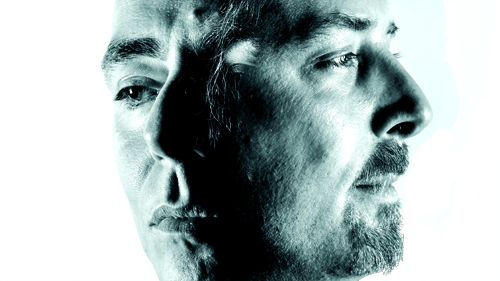
The two are getting ready to release their yet-to-be-titled sixth full-length album later this year. This comes 17 years after their game-changing album, ‘Wormhole’, which was written at the same time as Quinn was working on another game-changing album, Grooverider’s ‘Mysteries Of Funk’.
He spent mornings on that, switching gears in the evenings to work on ‘Wormhole’, while getting four hours of sleep per night for a year and a half. Scanning through the history of drum & bass, you would be hard-pressed to find any one artist going past two albums, let alone counting past one hand, and with the same members. The album was set for release last year, but was suspended due to the two’s unerring quality control.
“You have got to be tough on yourself,” says Quinn. “If you’re not prepared to criticize yourself, then don’t be surprised when everyone else does. We throw away a lot of songs we can’t put our name on. It’s good to be like that. The only thing we can do is spoil our reputations. It’s better not to have a record rather than have a crap record.”
ANTIDOTE
The number of releases on Virus Recordings is a handful a year, far fewer than it used to be. But their stable of artists has expanded with worldwide talent: Optiv (Switzerland) and BTK (Brazil), Mefjus (Austria) and InsideInfo (UK), Upbeats (New Zealand), Gridlok (USA), Maztek (Italy), MC Kryptomedic (Germany), plus Ed Rush and Optical mainstay vocalist: Ryme Tyme (UK). This is a far reach for the label that used to only put out releases from what felt like their founders’ immediate relatives who lived around the corner from each other.
“We’re of like mind,” Quinn says of the Virus roster, many of whom he also administers publishing for under Virus Music Publishing, with a very generous split for the artist. “We get stuff that is really unique. It sounds like them, but it sounds like Virus as well.
These artists are at a point in their career where they’re making the very best music they’re going to make — ever. We’re getting the good songs. There is very little chance of artists who haven’t already established an awful lot to come on Virus. We’re not putting out people we’ve just discovered.”
The newly discovered is Settle’s department, who develops fresh talent via his Piranha Pool imprint. “The new guys are musically talented. They can work on chord progressions and get melodies down whereas [Quinn] and I are noise engineers,” says Settle.
“I love melodic stuff, but I can’t make it. There is such an abundance of music around at the moment, if you want to stand out, there are the tools to do so. I still get really excited about having a bunch of new tunes to play out.”
Optical echoes: “The music I’ve got to play is, honestly, amazing. Compared to other years, it’s pretty sensational. What we’re playing is a strain of drum & bass. Because everyone else has gone so much fluffier, we feel like we’ve got to be the antidote.”
FABRICLIVE
A snapshot of what Quinn and Settle are playing currently at their gigs is what they are presenting on ‘FabricLive 82’. Long-time regulars at the famed venue, each of them put together playlists of what was in their sets for the other.
They picked the tracks they wanted to include together, evenly split them, and did half each in PreSonus Studio One. What’s heard is the reliably typical 'going for the jugular' Ed Rush and Optical set that makes the walls bleed. There is no tiptoeing around the brutal basslines; it’s just the opposite as they use those basslines to whip you about the head. But there is also a good dose of saucy breakbeats within the mix that signal the inherent funkiness of Ed Rush and Optical.
‘FabricLive 82’ also features similarly attuned producers Noisia, Audio, Phace, Spor and Detune, to touch on a few. There are unreleased numbers from the upcoming Ed Rush & Optical album as well as VIP remixes of previously released material, which gives the mix exclusivity. All of this is represented by a cover image of a decapitated pig’s head with honey pouring over it — not commissioned by them.
It is clubs that are the preferred setting for the two, with proximity to the audience and better soundsystems being the main reasons. Still, they are mainstays at most major festivals across the globe, on the bill for almost every EDC event and even the eye-popping Arcadia at Glastonbury, a festival Quinn used to sneak into as kid — and at which he never dreamed he would be on stage. He recently DJ'd a garden party for his mother and her guests in their 60s, where he played an all-vinyl '70s funk set from the 7000 records he has in that genre, a subsection of the music that was inspirational to him growing up.
Whatever the location, Quinn and Settle have reached a plateau of comfort. Settle wearing his black-rimmed glasses so he can see the writing on rekordbox, even leaner than he was in his 20s, enjoys himself just as much — now with more motivation as the father of two girls. With two sons, Quinn is equally motivated, and his inhibitions have finally fallen away.
“Being in front of a crowd was a stressful thing,” he says. “I’ve gotten over that completely. And I’ve got no shame whatsoever, so that helps. All the stupid things I could possibly do, I’ve done. I’ve knocked myself out in front of 2000 people. I’ve broken every part of the mixing set-up at one point or another, plus a whole soundsystem so they had to close the club.”
“I’ve seen him flourish in social situations where he used to shy away,” says Settle. “In a room full of people where years ago he might have taken a back seat, now he’s quite happy to stand up and show off.”
And so he should — Ed Rush & Optical have still got a lot to shout about.
Words: LILY MOAYERI
